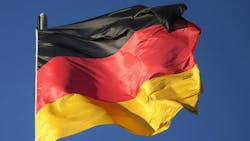Industry Strength from Germany to Spain Underpins Euro Optimism
Industrial production beat expectations in three of the largest euro area’s largest economies in a sign of broadening and strengthening momentum as the European Central Bank prepares to set the future course of monetary policy.
Output growth in Germany, the driver of the region’s recovery, unexpectedly accelerated in May, jumping 1.2% from the previous month.
Gauges for France and Spain also exceeded economists’ forecasts, rising 1.9% and 1.2%, respectively.
By contrast, the U.K. reported a surprise decline in production.
The ECB has acknowledged that the strengthening recovery gives it room to consider paring back stimulus even with inflation below its goal, as it can do so without tightening financial conditions. Executive Board member Benoit Coeure said the central bank will continue to adjust its instruments “qualitatively and quantitatively” whenever the inflation outlook allows.
The latest data come before a euro-area-wide report on July 12 that will feed into the Governing Council’s debate on the state of the economy at its policy meeting one week later. Officials are getting closer to discuss how to unwind stimulus even as inflation pressures remain muted, after President Mario Draghi said last month that risks to the growth outlook are “broadly balanced” and no longer tilted to the downside.
“The strong data we’re seeing back Draghi’s case, so dropping that reference is fully justified by the high growth dynamics,” said Johannes Mayr, senior economist at Bayerische Landesbank. “Even so, we don’t think that’s going to change the picture significantly if the inflation outlook remains low.”
Powerhouse Germany
Earlier this week, a survey of purchasing managers in manufacturing and services signaled the euro-area economy probably expanded 0.7% in the second quarter. In June, output increased in all nations covered in the poll for the first time in more than three years. The region’s four largest economies -- Germany, France, Italy and Spain -- probably saw growth accelerating in the April-June period.
Germany’s “cyclical upswing is expected to persist in the near term,” the International Monetary Fund said on July 7 in its Article IV consultation, commending “authorities for fostering Germany’s stable macroeconomic performance, being an engine of growth in the euro area.”
By Maria Tadeo
About the Author
Bloomberg
Licensed content from Bloomberg, copyright 2016.
